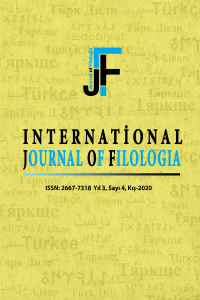
Journal of Filologia
Yazarlar: Burhan BARAN
Konular:Dil Bilim
Anahtar Kelimeler:16th century,Turkey Turkish,Semantic changes
Özet: As a living organism, language undergoes changes both in form and meaning. Developments in the tools and equipments people use, changing beliefs and living conditions, exposure to other languages, wars and migrations are some of the factors that cause changes in language. In line with these changes, also words, as a unit of language, go through semantic events such as semantic narrowing, semantic extension and semantic shift as part of semantic changes. Semantic narrowing refers to a type of semantic change by which a word loses one or multiple meanings, or shifts to a specific meaning from general meaning over time; semantic extension refers to the process through which words gain new meanings, or shifts to general meanings from specific meanings over time; and semantic shift refers to a change in the meaning of a word over time. These semantic changes occurring within a process are analysed diachronically. In linguistic and literary studies, identifying the semantic changes that words undergo is highly important to understand and interpret texts correctly. Considering the significance of identifying diachronic semantic changes, this paper analyses a manuscript called Cevahirü’l-Ahbar fi Hasayili’l-Ahyar that was written in the 16th century and contains the parable of Joseph written in prose as well as poetic religious stories, and reveal the semantic changes that some of the words in this manuscript underwent until the present day Turkey Turkish. However, the study does not stick to only this work and also presents examples from Dede Qorqud, Marzubanname, Harname, Tarama Dictionary, Compilation Dictionary, Kamus-ı Türki, Ottoman Turkish-Turkish Dictionary, Lehƈe-i Osmanî and Turkish Dictionary. The paper provides an analysis of semantic changes since the 16th century to the present day.
Dergi editörleri editör girişini kullanarak sisteme giriş yapabilirler. Editör girişi için tıklayınız.